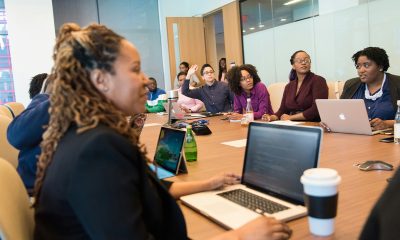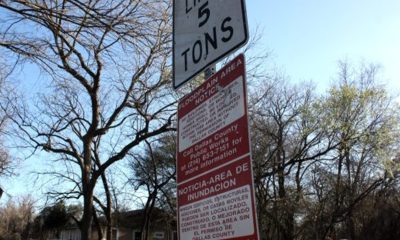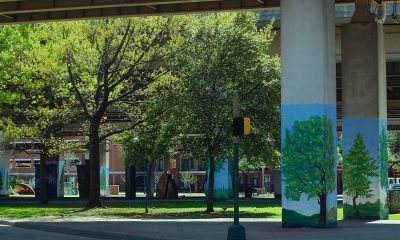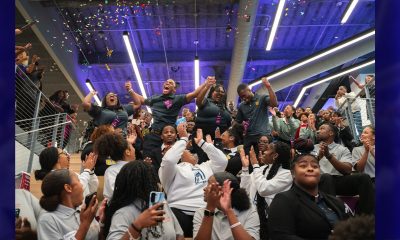Commentary
COMMENTARY: Robert F. Smith’s Morehouse and the call for self-sufficiency
SOUTH FLORIDA TIMES — Dozens of white parents were recently accused of paying millions of dollars in bribes to get their children into Ivy League universities. Such luxury is not available to African Americans, even if they were so inclined. Elijah Dormeus’ father died when he was 7 and he and his eight siblings were raised by a single mother in Harlem, N.Y., USA TODAY reported. His student loan debt to attend Morehouse College totaled $100,000. Brandon Manor also owed $100,000 and John Cooper, $98,000. But their loans will be paid off because another rich person saw a different way to use his wealth.
By Mohamed Hamaludin
Dozens of white parents were recently accused of paying millions of dollars in bribes to get their children into Ivy League universities. Such luxury is not available to African Americans, even if they were so inclined. Elijah Dormeus’ father died when he was 7 and he and his eight siblings were raised by a single mother in Harlem, N.Y., USA TODAY reported. His student loan debt to attend Morehouse College totaled $100,000. Brandon Manor also owed $100,000 and John Cooper, $98,000. But their loans will be paid off because another rich person saw a different way to use his wealth.
Robert F. Smith, 56, whose fortune, at $5 billion, makes him the richest African American — and one of only two African American billionaires – the other being retired basketball player Michael Jordan – was delivering Morehouse’s commence address on May 19 when he suddenly announced that he will pay off the debt of the entire class, which could be up to $40 million.
The Detroit Free Press reported that, in 2017, the average student debt at Morehouse, the Atlanta-based men’s college, where tuition, room and board cost about $48,000, is $31,833 and eight in 10 students have loans. The New York Times reported that, overall, African American graduates owe about $7,400 more than whites. Citing a report from the Brookings Institution, the paper said that, four years after graduation, African Americans still owe an average of $53,000 or twice as much as whites.
Forbes magazine put the number of billionaires in the U.S. at 585 with a total net worth of $2.4 trillion. Andres Viglucci reported in The Miami Herald that “30 fulltime resident billionaires — one of the highest concentrations in the world” live in Miami-Dade and “occupy the top of the pyramid atop deep and widespread poverty, a small and shrinking middle class and a large workforce dependent on poorly paid service jobs.” Viglucci was citing a report, “Toward a More Inclusive Region,” co-authored by urbanist Richard Florida and New York University professor Steven Pedigo for the Miami Urban Future Initiative think tank at Florida International University. The researchers found that the rich-poor gap is worse only in New York City and on par with Panama and Colombia.
Those wealthy people do nothing to help the communities that offer them an oppor tunity to shelter their assets due to Florida’s generous property safeguard laws.
But then Smith seems to have been made from a different mold. He grew up in a predominantly African American community in Colorado, his parents high school principals with doctorates. Wikipedia says that as an infant his mother took him to the March on Washington, where Martin Luther King Jr. delivered his “I Have a Dream” speech. The New York Times reported that when he was a child she was sending monthly checks of $25 to the United Negro College Fund.
Smith studied chemical engineering at Cornell University and business administration at Columbia University. After a variety of jobs in finance and technology, he founded Vista Equity Partners in 2000, specializing in buying and selling software companies and managing assets totaling $46 billion. His growing wealth did not pull him from his community but, rather, sharpened his interest in the economic condition and educational opportunities of African Americans.
But his Morehouse gesture is not without critics. “The penny-pinching parents wonder where’s their reward for driving their cars until the vehicles have to be towed off the road,” Michelle Singletary commented in The Washington Post. “What do they get for forgoing expensive vacations so that they could put money in a … college savings plan, thereby eliminating or greatly reducing the need for them or their children to take out student loans?”
Anand Giridharadas, author of “Winners Take All,” told The New York Times that donations such as Smith’s “can make people believe that billionaires are taking care of our problems and distract us from ways in which others in finance are working to cause problems like student debts or the subprime crisis on a epically greater scale than this gift.”
Both may have a point and perhaps Smith should instead have followed the lead of Oprah Winfrey and help those who cannot afford loans or are in danger of dropping out of college. Winfrey donated $1 million to Morehouse 30 years ago to establish a scholarship fund in her name; it has since grown to $12 million.
Still, because of Smith, Elijah Dormeus can now focus on helping his younger brother, Jeremiah, pay for college. Brandon Manor can widen his medical school search and John Cooper can pursue his plan to attend law school.
And Smith had a challenge for the students: “Let’s make sure every class has the same opportunity going forward, because we are enough to take care of our own community. We are enough to ensure we have all of the opportunities of the American dream and we will show it to each other through our actions and through our words and through our deeds.”
Dormeus, for one, plans to do just that. He is hoping to create a foundation to help people pay off their debts and get into college, USA TODAY reported.
This article originally appeared in the South Florida Times
Commentary
Commentary: Republican Votes Are Threatening American Democracy
In many ways, it was great that the Iowa Caucuses were on the same day as Martin Luther King Jr. Day. We needed to know the blunt truth. The takeaway message after the Iowa Caucuses where Donald Trump finished more than 30 points in front of Florida Gov. De Santis and former South Carolina Governor Nikki Haley boils down to this: Our democracy is threatened, for real.

By Emil Guillermo
In many ways, it was great that the Iowa Caucuses were on the same day as Martin Luther King Jr. Day.
We needed to know the blunt truth.
The takeaway message after the Iowa Caucuses where Donald Trump finished more than 30 points in front of Florida Gov. De Santis and former South Carolina Governor Nikki Haley boils down to this: Our democracy is threatened, for real.
And to save it will require all hands on deck.
It was strange for Iowans to caucus on MLK day. It had a self-cancelling effect. The day that honored America’s civil rights and anti-discrimination hero was negated by evening.
That’s when one of the least diverse states in the nation let the world know that white Americans absolutely love Donald Trump. No ifs, ands or buts.
No man is above the law? To the majority of his supporters, it seems Trump is.
It’s an anti-democracy loyalty that has spread like a political virus.
No matter what he does, Trump’s their guy. Trump received 51% of caucus-goers votes to beat Florida Gov. Ron DeSantis, who garnered 21.2%, and former South Carolina Gov. Nikki Haley, who got 19.1%.
The Asian flash in the pan Vivek Ramaswamy finished way behind and dropped out. Perhaps to get in the VP line. Don’t count on it.
According to CNN’s entrance polls, when caucus-goers were asked if they were a part of the “MAGA movement,” nearly half — 46% — said yes. More revealing: “Do you think Biden legitimately won in 2020?”
Only 29% said “yes.”
That means an overwhelming 66% said “no,” thus showing the deep roots in Iowa of the “Big Lie,” the belief in a falsehood that Trump was a victim of election theft.
Even more revealing and posing a direct threat to our democracy was the question of whether Trump was fit for the presidency, even if convicted of a crime.
Sixty-five percent said “yes.”
Who says that about anyone of color indicted on 91 criminal felony counts?
Would a BIPOC executive found liable for business fraud in civil court be given a pass?
How about a BIPOC person found liable for sexual assault?
Iowans have debased the phrase, “no man is above the law.” It’s a mindset that would vote in an American dictatorship.
Compare Iowa with voters in Asia last weekend. Taiwan rejected threats from authoritarian Beijing and elected pro-democracy Taiwanese vice president Lai Ching-te as its new president.
Meanwhile, in our country, which supposedly knows a thing or two about democracy, the Iowa caucuses show how Americans feel about authoritarianism.
Some Americans actually like it even more than the Constitution allows.
About the Author
Emil Guillermo is a journalist and commentator. He does a mini-talk show on YouTube.com/@emilamok1.
Activism
Oakland Post: Week of April 10 – 16, 2024
The printed Weekly Edition of the Oakland Post: Week of April 10 – 16, 2024

To enlarge your view of this issue, use the slider, magnifying glass icon or full page icon in the lower right corner of the browser window. ![]()
Activism
Oakland Post: Week of April 3 – 6, 2024
The printed Weekly Edition of the Oakland Post: Week of April 3 – 6, 2024
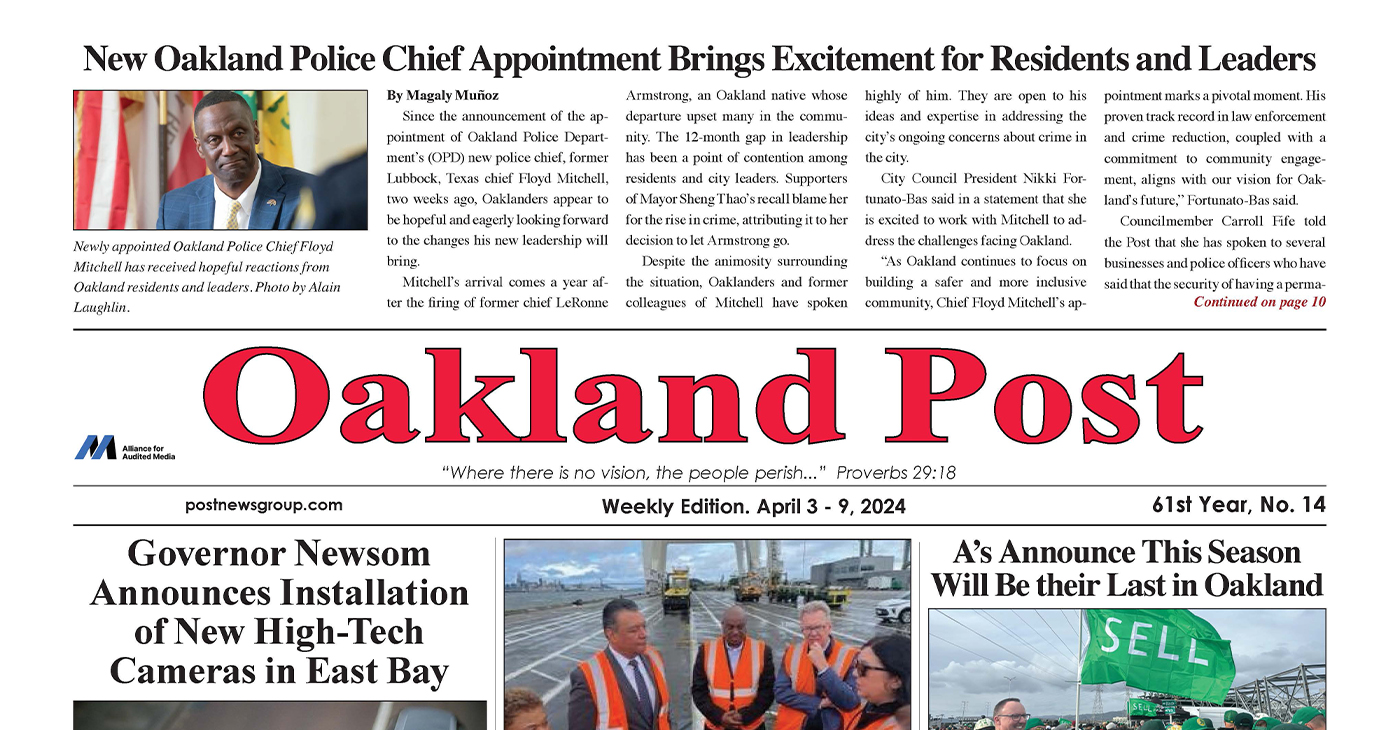
To enlarge your view of this issue, use the slider, magnifying glass icon or full page icon in the lower right corner of the browser window. ![]()
-

 Activism4 weeks ago
Activism4 weeks agoOakland Post: Week of March 20 – 26, 2024
-

 #NNPA BlackPress3 weeks ago
#NNPA BlackPress3 weeks agoMayor, City Council President React to May 31 Closing of Birmingham-Southern College
-

 #NNPA BlackPress3 weeks ago
#NNPA BlackPress3 weeks agoCOMMENTARY: D.C. Crime Bill Fails to Address Root Causes of Violence and Incarceration
-

 #NNPA BlackPress3 weeks ago
#NNPA BlackPress3 weeks agoFrom Raids to Revelations: The Dark Turn in Sean ‘Diddy’ Combs’ Saga
-

 #NNPA BlackPress3 weeks ago
#NNPA BlackPress3 weeks agoCOMMENTARY: Lady Day and The Lights!
-

 #NNPA BlackPress3 weeks ago
#NNPA BlackPress3 weeks agoBaltimore Key Bridge Catastrophe: A City’s Heartbreak and a Nation’s Alarm
-

 #NNPA BlackPress3 weeks ago
#NNPA BlackPress3 weeks agoBaltimore’s Key Bridge Struck by Ship, Collapses into Water
-

 Activism3 weeks ago
Activism3 weeks agoOakland Post: Week of March 27 – April 2, 2024


